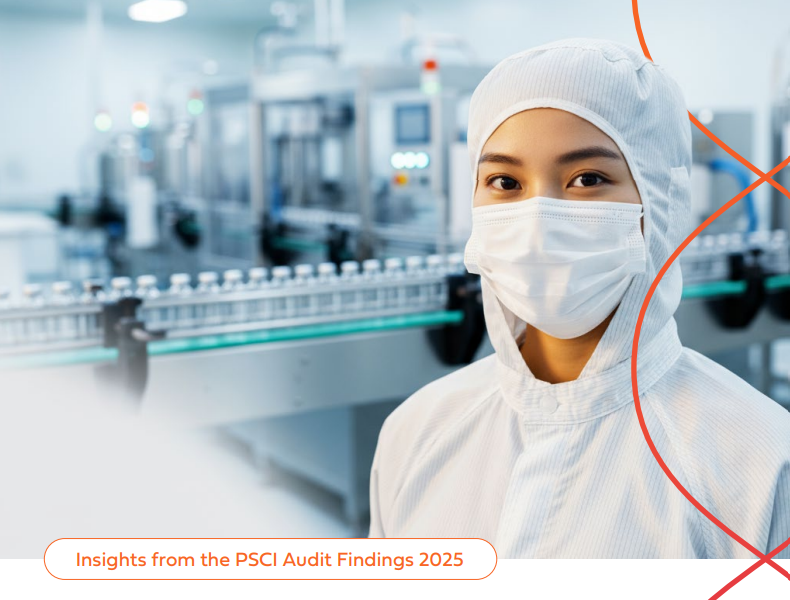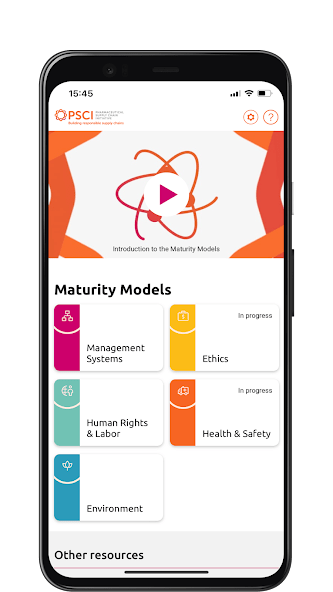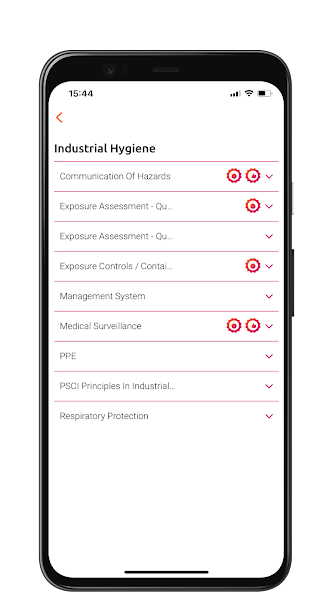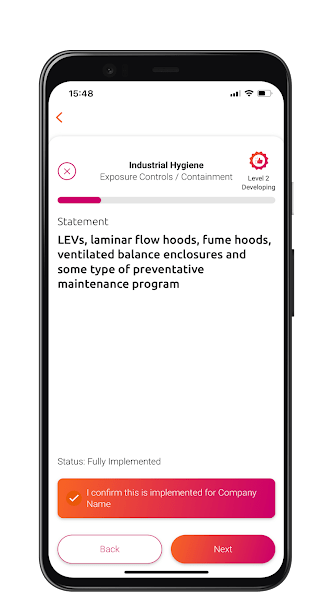This resource was published on 27 February
This presentation provides external stakeholders with a clear and accessible overview of the 2026 update to the PSCI Principles for Responsible Supply Chain Management. Building on the high‑level timeline, the deck offers background, context, and practical guidance to support meaningful participation in the open consultation.
What’s Inside:
- Principles Update: Background
An explanation of why the Principles are refreshed every three years, how they support alignment across the pharmaceutical supply chain, and the objectives guiding the 2026 update.
- Guidance for Providing Input
Straightforward instructions on how external participants can share feedback, including how comments will be reviewed and considered by PSCI Topic Teams.
- Timeline
A step‑by‑step look at the full update cycle—from early scoping through to final approval—highlighting key points where external perspectives can shape the outcome.
- Priority Stakeholders
Insight into the groups contributing to the refresh, including PSCI members, external experts, civil society organisations, suppliers, and other industry stakeholders.
This deck is designed to help you understand the consultation process and feel confident contributing your perspective.
The PSCI encourages all external stakeholders to review it before submitting input through the consultation channels.
Please see the timeline resource
This resource was published on 20 February
Get a quick update on the latest PSCI news, including the PSCI Principles Review & Future Audit Protocol Update, the PSCI Supplier Decarbonization Help Desk, webinars, new learning courses, and more.
This resource was published on 20 January
Get a quick update on the latest PSCI news. From the newly announced 2026 Board to the launch of the integrated online audit process, new learning courses, upcoming webinars, and more.
This resource was published on 7 January
About: This webinar is presented in Japanese.
Antimicrobial Resistance (AMR) is a critical global challenge that poses serious threats to healthcare systems worldwide. This webinar provides a clear overview of the fundamentals of AMR and outline how the pharmaceutical industry should respond to this pressing issue.
It introduces the Antibiotic Manufacturing Standard developed by the AMR Industry Alliance and highlight emerging certification schemes designed to ensure responsible practices across the industry. In addition, key initiatives led by the SHIONOGI Group will be presented, illustrating the path toward sustainable healthcare.
This session offers a valuable opportunity to deepen your understanding of AMR and explore practical approaches to addressing this global concern.
Speakers
- Kozo Ohashi, EHS Management Group Member, Corporate Governance Department, Shionogi
Kozo Ohashi has 3 years of experience in EHS management at SHIONOGI, leading responsible manufacturing initiatives for antimicrobial resistance (AMR). He is a member of the AMR Industry Alliance Manufacturing Working Group and previously spent 18 years in clinical development, contributing to new drug research, including antibiotics.
- Wenjia Xu, Associate Director, Global Safety and Environment, MSD, PSCI capability committee co-lead
Wenjia is an EHS professional with 20 years of experience in chemical and pharmaceutical industries, currently at MSD Global Safety and Environment. He specializes in EHS due diligence for suppliers and projects and has strong expertise in PSCI principles through 8 years of audit and capability-building work.
The slides used in the webinar can be accessed here.
This resource was published on 23 December 2025
About : This webinar is presented in Mandarin. It decodes the “Three-Step Framework” of the decarbonisation handbook, using seven key impact areas in the pharmaceutical industry—R&D/Clinical, Laboratories, Production & Energy, Supply Chain & Logistics, Packaging, and Green IT—as a guide.
It breaks down the potential, cost, implementation timeline, and regulatory complexity of 24 actionable carbon reduction measures one by one, helping EHS, Procurement, and Operations teams collaboratively develop a localized priority action list. Additionally, it provides an overview of six key organizational capabilities to support implementation from pilot to scale.
Speakers
- Li Liu, Boehringer-Ingelheim, EHS&S Manager
- Thea Zhang, Boehringer-Ingelheim, EHS Supervisor
PSCI China Website link: Toward Net-Zero - Interpreting the PSCI Decarbonization Playbook
This resource was published on 23 December 2025
About: This webinar is presented in Mandarin and the presentation slides are bilingual in Mandarin/English.
This webinar outlines the market for renewable energy procurement in China and opportunities to progress renewable energy sourcing.
Speakers
- Gary Lu, AstraZeneca APAC, SHE and Sustainability Director
- Christian Romig, Boston Consulting Group, Associate Director.
PSCI China Website link: Renewable Energy Sourcing: Market and Practice
This resource was published on 19 December 2025
2025 was another year of impact for the PSCI, full of highlights that were made possible by the dedication and expertise of our Members and delivered benefits for Members, suppliers, and ultimately patients across the world.
From projects to partnerships and beyond, the PSCI is the place to be for collaboration across the sector, creating change, impact, and value.
Through the contributions of the Board, Committees, Topic Teams, and Regional Teams, we are shaping the supplier market and delivering our mission of building responsible supply chains.
Watch this video to hear more.
This resource was published on 11 December 2025
The third session of the 2025 PSCI China Supplier Conference took place on November 19, covering Environment, Decarbonisation, Audit.
2025年中国供应商大会第三天于上海线下举行,覆盖安全总览、过程安全、工业卫生议题。
Speaker:
Liang Hong | Engineering Manager | WSP
演讲嘉宾:
洪亮 | 工程经理 | 科进柏诚工程技术(北京)有限公司上海分公司
Topic: The design, operation and maintenance of isolator
议题:隔离器的设计、使用和维护
To access the slides, please click "DOWNLOAD". 下载会议PPT,请点击下方DOWNLOAD按钮
-
Health & Safety
-
Occupational Health & Industrial Hygiene
This resource was published on 11 December 2025
The third session of the 2025 PSCI China Supplier Conference took place on November 19, covering Environment, Decarbonisation, Audit.
2025年中国供应商大会第三天于上海线下举行,覆盖安全总览、过程安全、工业卫生议题。
Speaker:
David Lv | Technical Director | BEEREE Safety Technologies (Hangzhou) Co., Ltd.
演讲嘉宾:
吕华军 | 技术总监 | 碧瑞安全技术(杭州)有限公司
Topic: Discussions on Differences Between Exposure Assessment and Airtightness Testing
议题:暴露评估与密闭性测试的差异分享
To access the slides, please click "DOWNLOAD". 下载会议PPT,请点击下方DOWNLOAD按钮
-
Health & Safety
-
Occupational Health & Industrial Hygiene
This resource was published on 11 December 2025
The third session of the 2025 PSCI China Supplier Conference took place on November 19, covering Environment, Decarbonisation, Audit.
2025年中国供应商大会第三天于上海线下举行,覆盖安全总览、过程安全、工业卫生议题。
Speaker:
Jiawei Zhang | IH Service Leader | Zhanghan Consulting (Shanghai) Co., Ltd.
演讲嘉宾:
张佳维 | 工业卫生服务经理 | 章含管理咨询(上海)有限公司
Topic: Comprehensive Lifecycle Management of Chemicals and Hazards
议题:化学品及其危害因素的全流程管理
To access the slides, please click "DOWNLOAD". 下载会议PPT,请点击下方DOWNLOAD按钮
-
Health & Safety
-
Occupational Health & Industrial Hygiene
This resource was published on 11 December 2025
The third session of the 2025 PSCI China Supplier Conference took place on November 19, covering Environment, Decarbonisation, Audit.
2025年中国供应商大会第三天于上海线下举行,覆盖安全总览、过程安全、工业卫生议题。
Speaker:
Lemon Wu | IDP Section Manager | TUV SUD
演讲嘉宾:
吴宙遨 | 防爆部门经理 | 南德意志大中华集团上海分公司
Topic: Overview of Dust Explosion Parameter Measurement and Dust Removal System Design
议题:制药行业粉尘爆炸参数的测定与除尘系统设计概论
To access the slides, please click "DOWNLOAD". 下载会议PPT,请点击下方DOWNLOAD按钮
-
Health & Safety
-
Process Safety
This resource was published on 11 December 2025
The third session of the 2025 PSCI China Supplier Conference took place on November 19, covering Environment, Decarbonisation, Audit.
2025年中国供应商大会第三天于上海线下举行,覆盖安全总览、过程安全、工业卫生议题。
Speaker:
Roderick Yuan | Technical Director | Shanghai STRM Technology Co., Ltd.
演讲嘉宾:
员文权 | 技术总监 | 上海翊员科技有限公司
Topic: Application of LOPA in SIL Determination
议题:LOPA在SIL定级中的应用
To access the slides, please click "DOWNLOAD". 下载会议PPT,请点击下方DOWNLOAD按钮
-
Health & Safety
-
Process Safety
This resource was published on 11 December 2025
The third session of the 2025 PSCI China Supplier Conference took place on November 19, covering Environment, Decarbonisation, Audit.
2025年中国供应商大会第三天于上海线下举行,覆盖安全总览、过程安全、工业卫生议题。
Speaker:
Ken Sun | AP EHS&S Lead | GSK
演讲嘉宾:
孙大勇 | 亚太区EHS与可持续发展经理 | 葛兰素史克
Topic: PSCI Audit Findings on Process Safety and Incident Sharing
议题:安全事故案例分享及PSCI过程安全相关审计发现
To access the slides, please click "DOWNLOAD". 下载会议PPT,请点击下方DOWNLOAD按钮
-
Health & Safety
-
Process Safety
This resource was published on 11 December 2025
The second session of the 2025 PSCI China Supplier Conference took place on November 18, covering Environment, Decarbonisation, Audit.
2025年中国供应商大会第二天于上海线下举行,覆盖环境、节能减排、审计议题。
Speaker:
Lei Jiang | EHS Executive Director | Pharmaron Shaoxing Co., Ltd.
演讲嘉宾:
蒋磊 | EHS执行总监 | 康龙化成(绍兴)药业有限公司
Topic: Environmental practice based on the PSCI Management Maturity Model
议题:基于PSCI成熟度模型的环境管理实践
To access the slides, please click "DOWNLOAD". 下载会议PPT,请点击下方DOWNLOAD按钮
This resource was published on 11 December 2025
The second session of the 2025 PSCI China Supplier Conference took place on November 18, covering Environment, Decarbonisation, Audit.
2025年中国供应商大会第二天于上海线下举行,覆盖环境、节能减排、审计议题。
Speaker:
Jinyun Tang | EHS Lead | Chongqing Carelife Pharmaceutical Co., Ltd.
Wenjun Wang | Senior EHS Manager | Pfizer
Victor Ren | Supplier HSE Assurance Manager | Sandoz
演讲嘉宾:
唐金云 | EHS主管 | 重庆凯林制药有限公司
王文君 | 高级EHS经理 | 辉瑞
任维农 | 供应商HSE保障主管 | 山德士
Topic: Round Table Session: Practice Sharing for AMR Certification
议题:圆桌讨论:AMR认证实践经验分享
To access the slides, please click "DOWNLOAD". 下载会议PPT,请点击下方DOWNLOAD按钮
-
Environment
-
Anti-Microbial Resistance
This resource was published on 11 December 2025
The second session of the 2025 PSCI China Supplier Conference took place on November 18, covering Environment, Decarbonisation, Audit.
2025年中国供应商大会第二天于上海线下举行,覆盖环境、节能减排、审计议题。
Speaker:
Thea Zhang, EHS Supervisor, Boehringer-Ingelheim
演讲嘉宾:
张前雯,EHS主管,勃林格殷格翰
Topic: PSCI Supplier Decarbonisation Playbook
议题:PSCI供应商减碳手册解读
To access the slides, please click "DOWNLOAD". 下载会议PPT,请点击下方DOWNLOAD按钮
This resource was published on 11 December 2025
The second session of the 2025 PSCI China Supplier Conference took place on November 18, covering Environment, Decarbonisation, Audit.
2025年中国供应商大会第二天于上海线下举行,覆盖环境、节能减排、审计议题。
Speaker:
David Wei | Associate Director of Utility Management | AstraZeneca
Shuji Chen | Associate Director | EECO2 China (affiliated with Energy Efficiency Consultancy Group Limited)
演讲嘉宾:
韦雁翔 | 介质管理副总监 | 阿斯利康
陈蜀冀 | 副总监 | 易客图(苏州)信息有限公司
Topic: Improving Energy Efficiency
议题:能源效率提升的实施路径
To access the slides, please click "DOWNLOAD". 下载会议PPT,请点击下方DOWNLOAD按钮
This resource was published on 11 December 2025
The first session of the 2025 PSCI China Supplier Conference took place on November 17, covering Introduction, Management System, Human Rights & Ethics.
2025年中国供应商大会第一天于上海线下举行,覆盖PSCI 最新发展、管理体系、劳工与商业道德议题。
Speaker:
Minnie Mai | Senior Technical Manager | TUV Rheinland
演讲嘉宾:
麦璐 | 高级技术经理 | TUV莱茵
Topic: Information Security & Personal Data Protection in PSCI Audits/AI Application
议题:PSCI审计/AI应用中的信息安全与隐私数据保护
To access the slides, please click "DOWNLOAD". 下载会议PPT,请点击下方DOWNLOAD按钮
-
Ethics
-
Data Privacy
-
Data Security
This resource was published on 11 December 2025
The first session of the 2025 PSCI China Supplier Conference took place on November 17, covering Introduction, Management System, Human Rights & Ethics.
2025年中国供应商大会第一天于上海线下举行,覆盖PSCI 最新发展、管理体系、劳工与商业道德议题。
Speaker:
Xiaoming Wang | Principal Consultant | QD Wagner Biotechnology Consulting Co., Ltd.
演讲嘉宾:
王晓明 | 首席顾问 | QD瓦格纳生物科技咨询有限公司
Topic: Bacteria Endotoxin Testing Theory & Practice
议题:细菌内毒素检测的理论与实践
To access the slides, please click "DOWNLOAD". 下载会议PPT,请点击下方DOWNLOAD按钮
This resource was published on 11 December 2025
The first session of the 2025 PSCI China Supplier Conference took place on November 17, covering Introduction, Management System, Human Rights & Ethics.
2025年中国供应商大会第一天于上海线下举行,覆盖PSCI 最新发展、管理体系、劳工与商业道德议题。
Speaker:
Lena Pan | Team Leader | Baohua Law Firm
演讲嘉宾:
潘丽娜 | 团队负责人 | 保华律师事务所
Topic: Occupational Health & Safety Management and Social Insurance
议题:劳动用工合规——职业健康安全与社会保险制度
To access the slides, please click "DOWNLOAD". 下载会议PPT,请点击下方DOWNLOAD按钮
-
Human Rights & Labor
-
Wages, Benefits & Working Hours
This resource was published on 11 December 2025
The first session of the 2025 PSCI China Supplier Conference took place on November 17, covering Introduction, Management System, Human Rights & Ethics.
2025年中国供应商大会第一天于上海线下举行,覆盖PSCI 最新发展、管理体系、劳工与商业道德议题。
Speaker:
Emma Lu | Technical Solution Manager | BSI
演讲嘉宾:
卢峻仪 | 技术方案经理 | 英国标准协会
Topic: How to ensure working hours and salary benefits‘ compliance
议题:如何确保员工工作时间和薪资福利符合要求
To access the slides, please click "DOWNLOAD". 下载会议PPT,请点击下方DOWNLOAD按钮
-
Human Rights & Labor
-
Wages, Benefits & Working Hours
This resource was published on 11 December 2025
The first session of the 2025 PSCI China Supplier Conference took place on November 17, covering Introduction, Management System, Human Rights & Ethics.
2025年中国供应商大会第一天于上海线下举行,覆盖PSCI 最新发展、管理体系、劳工与商业道德议题。
Speaker:
Felix Ding | Region HSE Lead | Novartis
Graham Ding | HSE EPRM Business Partner | Novartis
演讲嘉宾:
丁晓阳 | 地区HSE主管 | 诺华
丁周琛 | HSE EPRM 业务伙伴 | 诺华
Topic: Building an ESG Management Structure
议题:ESG管理体系搭建
To access the slides, please click "DOWNLOAD". 下载会议PPT,请点击下方DOWNLOAD按钮
This resource was published on 11 December 2025
The first session of the 2025 PSCI China Supplier Conference took place on November 17, covering Introduction, Management System, Human Rights & Ethics.
2025年中国供应商大会第一天于上海线下举行,覆盖PSCI 最新发展、管理体系、劳工与商业道德议题。
Speaker:
Li Liu | EHS&S Manager| Boehringer-Ingelheim / PSCI China Regional Committee Co-Lead
演讲嘉宾:
刘立 | EHS&S 主管 | 勃林格殷格翰 / PSCI中国区负责人
Topic: Updates on PSCI
议题:PSCI最新动态
To access the slides, please click "DOWNLOAD". 下载会议PPT,请点击下方DOWNLOAD按钮
This resource was published on 11 December 2025
The first session of the 2025 PSCI China Supplier Conference took place on November 17, covering Introduction, Management System, Human Rights & Ethics.
2025年中国供应商大会第一天于上海线下举行,覆盖PSCI 最新发展、管理体系、劳工与商业道德议题。
Speaker:
Fei Ren | Director of DIvision III of Multilateral Cooperation, Department of Multilateral Cooperation | Deputy Secretary General of Sustainable Markets Initiative China Council
演讲嘉宾:
任飞 | 中国国际商会多边部多边合作三处处长 | ”可持续市场倡议“中国理事会副秘书长
Topic: Deepen Green Transformation and Jointly Build a Zero-Carbon Healthcare System —— Practice and Outlook of the Health Working Group under the Sustainable Markets Initiative China Council
议题:深耕绿色转型,共筑零碳医疗 ——“可持续市场倡议” 中国理事会健康系统工作组实践与展望
To access the slides, please click "DOWNLOAD". 下载会议PPT,请点击下方DOWNLOAD按钮
This resource was published on 26 November 2025
The pharmaceutical sector's Scope 3 emissions from purchased goods and services total over 272 million tCO2-e, representing more than 80% of the industry's carbon footprint. This webinar highlights how suppliers across the pharmaceutical value chain are driving verified, measurable climate impact and helping companies meet rising ESG expectations.
Join James Connelly, CEO of My Green Lab, to deep dive into the tools empowering pharmaceutical suppliers to deliver verified sustainability performance. He will cover the Converge Supplier Initiative, My Green Lab Certification, the ACT RFP Letter, ACT API integration into purchasing platforms, and the ACT Ecolabel for verified claims. James will also share insights from My Green Lab's 2025 Carbon Impact Report, showing how supplier engagement accelerates Scope 3 reductions. Whether you’re a supplier seeking to differentiate or a pharmaceutical company aiming to strengthen supplier collaboration, this session offers actionable pathways to achieve measurable climate results.
The associated slides for this recording can be found here
This resource was published on 26 November 2025
This resource was published on 18 November 2025
This resource was published on 18 November 2025
This resource was published on 18 November 2025
This resource was published on 18 November 2025
This resource was published on 18 November 2025
This resource was published on 18 November 2025
This resource was published on 17 November 2025
2025年11月17日 - 在2025年中国供应商大会期间, PSCI发布2024年度报告中文版,彰显PSCI扩大对中国供应商影响力的努力与决心。
17 Nov 2025 - PSCI released the Chinese version of its 2024 Annual Report at our 2025 China Supplier Conference in Shanghai. This move signifies PSCI's efforts in engaging more suppliers and expanding its impact in key sourcing regions for member companies.
More Info…
报告亮点 Highlights
审计
- PSCI平台上已有1,208份审计
- 更新版自评问卷(SAQ)发布
- 2024年开始开发新数字平台Link 2.0,预计在2025年投入使用
能力建设
- 共计1,100位观众参加22场线上研讨会
- 共计1,150位观众参加在中国、印度等地举办的三场供应商大会
- 37门Learnster课程供供应商在线学习,包括新开发的新能源和生物多样性相关课程
- 逾2,900位用户,2,100家供应商工厂在PSCI平台Link上注册
协作项目
- 11个成员主导的协作项目, 投入超30万美金
- 与Energize项目持续合作
供应商合作伙伴关系
- 12家公司于2024年加入供应商合作伙伴关系
- 举办首个供应商合作伙伴论坛,在审计的价值、范围三排放、地区支持等方面持续与供应商对话。
领导建言
2024年PSCI主席Deirdre O’Reilly表示:“当2013年,几家创始成员公司走到一起的时候,他们展望着分享行业知识、创造透明、高效、可持续的供应链的愿景。回首过去十年,我们在不停地朝这一初始愿景迈进,而且清楚地看到还有哪些目标是我们还需要努力达到的。”
2025年PSCI主席Rob Williams表示:“坐拥着超过2,000家供应商和不断扩大的全球影响力,PSCI在塑造负责任供应链的未来方面占据独特地位。2025年,我们期待推出升级的数字平台,扩大在中国的影响力,并加深合作伙伴关系以扩大影响力。”
This resource was published on 14 November 2025
This resource was published on 14 November 2025
This resource was published on 14 November 2025
This resource was published on 14 November 2025
This resource was published on 14 November 2025
This resource was published on 14 November 2025
This resource was published on 14 November 2025
This resource was published on 14 November 2025
This resource was published on 12 November 2025
This resource was published on 12 November 2025
This resource was published on 12 November 2025
This resource was published on 12 November 2025
This resource was published on 12 November 2025
This resource was published on 12 November 2025
This resource was published on 12 November 2025
This resource was published on 12 November 2025

THE PSCI PRESENTS ITS ANNUAL PUBLIC AUDIT FINDINGS REPORT, PROVIDING CONTINUED INSIGHTS INTO SUPPLIER RISKS, TRENDS, AND AREAS FOR IMPROVEMENT ACROSS THE PHARMACEUTICAL AND HEALTHCARE SUPPLY CHAIN.
Pharmaceutical and healthcare companies run thousands of audits of their suppliers’ sites annually. Audits typically require between two to four days of focused, on-site effort from both the auditor and the supplier. PSCI members work together to share these audits, in support of greater transparency and valuable efficiencies that benefit both members and suppliers.
This report shares our analysis of findings from PSCI audits available on our platform. Each year, we review these in line with the PSCI Principles to identify trends, highlight improvements, and share recommendations. PSCI work with member companies, suppliers, and regional partners to turn analysis into practical guidance, training, and peer learning that suppliers can implement quickly. Overall, this analysis provides deep insight into supplier practices within the pharmaceutical and healthcare industry and suggests where collaborative efforts will have the greatest impact, guiding us on developing targeted resources and trainings.
This year’s report analyzes 2,046 findings from 228 supplier audits uploaded to the PSCI platform in 2024. These findings are categorised into 428 Governance & Management Systems findings, 26 Ethics findings, 273 Human Rights findings, 1,098 Health & Safety findings, and 221 Environment findings, offering a comprehensive overview of supplier practices and opportunities for improvement. The report includes a summary of findings across key topics, as well as a regional analysis looking at patterns across China, India, US, Western Europe, and other regions represented in this year’s uploads, presenting recommended actions for suppliers.
This resource was published on 11 November 2025
The commercial and sales teams in the pharmaceutical industry spend a significant amount of time traveling to meet healthcare providers, distributors, and customers across diverse geographies. Road safety is the number one risk in India and road incidents directly impact personal safety, business continuity, and customer engagement.
This session will cover key aspects of road safety including safe driving practices and behaviours, managing fatigue and stress on the road, and the importance of avoiding distractions while driving. Demonstrating leadership in road safety strengthens employee engagement, corporate reputation, supports ESG commitments, and contributes to India’s National Road Safety Mission. By participating, you can help your organizations drive collective action towards a safer, more responsible, and resilient pharmaceutical ecosystem.
Speakers:
Mahesh Chandak
Head of SSHE - South Asia and Global Road Safety Lead, Bayer
Rajani Chavan
SSHE Enablement Lead, South Asia and India Road Safety lead, Bayer
The associated slides can be downloaded here



